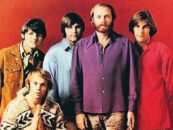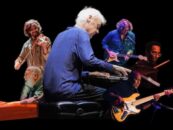Queen’s Homage to Space Exploration, “’39”
by Best Classic Bands Staff
Queen’s Roger Taylor, Freddie Mercury, Brian May and John Deacon on the single’s picture sleeve.
Many of us can do one thing well. Queen co-founder Brian May can do many things well.
Prior to forming the band, he studied physics and mathematics at Imperial College in London. As the band began to achieve success, he put his quest for advanced degrees on hold. In a span of just over five years, Queen–May, Freddie Mercury, Roger Taylor and John Deacon–released an astonishing seven studio albums and were well on their way to becoming one of the biggest rock bands in the world.
The band’s lead guitarist wrote many of their memorable classic rock songs, most notably the anthem “We Will Rock You,” but also “Fat Bottomed Girls” and “Tie Your Mother Down,” among others.
May’s fascination with space exploration is evidenced in his composition, “’39,” included on Queen’s 1975 A Night at the Opera. The lyrics tell of 20 members of the mission (“the score brave souls inside” that “sailed across the milky sea”). Upon their return, the explorers are surprised to discover that even though their mission lasted just one year (“though I’m older but a year”), decades have passed for those they left behind (“for so many years have gone”) due to their time travel at the speed of light.
They’re now home… but their immediate families are no longer alive (“but my love this cannot be”). So much time has passed, the explorers are now among their descendants (“the land that our grandchildren knew”). As May explains, for space travelers “time is different for you than it is for people at home.”
The song was released as the B-side for “You’re My Best Friend” on June 18, 1976.
Watch the lyric video for the song with May singing lead on his composition
Related: Our Album Rewind of A Night at the Opera
Despite May’s beautiful vocal on the recorded version, Mercury usually sang lead when the band performed it in concert. Here they are at London’s Earl’s Court in 1977. (Only Freddie could get away with that amazing harlequin stage costume…)
And one more… Watch May and Rick Wakeman play the song at the 2014 Starmus conference
May, born July 19, 1947, didn’t abandon his quest for the advanced degree that he had been studying for decades earlier. In 2006, he resumed his studies at London’s Imperial College and submitted his thesis titled A Survey of Radial Velocities in the Zodiacal Dust Cloud less than a year later. In 2008, he received his PhD in Astrophysics.
In 2015, Dr. Brian May was a collaborator on NASA’s New Horizons space probe team of Pluto at the Johns Hopkins University Applied Physics Laboratory.
May shared his thoughts upon hearing the news of Stephen Hawking’s passing on March 14, 2018.
Related: Brian May was knighted in a ceremony at Buckingham Palace on March 14, 2023







No Comments so far
Jump into a conversationNo Comments Yet!
You can be the one to start a conversation.